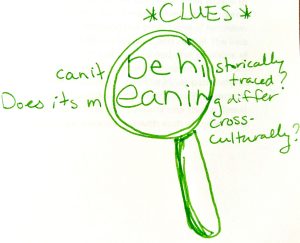4 Social Constructions
Pooja Mohabeer
 Social constructionism is the idea that society is not given in the order of nature, but rather something that we make. But how can we discern if something in our society is socially constructed? Two questions need to be asked:
Social constructionism is the idea that society is not given in the order of nature, but rather something that we make. But how can we discern if something in our society is socially constructed? Two questions need to be asked:
Can it be historically traced?
And, does its meaning differ cross-culturally?
In exploring their role in society, we can argue that “sex,” “gender,” and “sexuality” are socially constructed. Throughout history, in different parts of the world and in different cultures, societies have had different and distinct systems of sex, gender, and sexuality rooted in how that society functions.
Dualism is foundational to dominant gender ideology. Societies’ gravitation towards dualisms is problematic because dualism’s very nature renders one part superior over the other. For instance, patriarchy allows men to experience life more conveniently than women. This is exemplified in the diminishment of women’s rights, the gender pay gap, the underrepresentation of women in positions of power, the overrepresentation of women among the impoverished, and more. Members of the LGBTQA+ community, or anyone who does not conform to the dominant gender ideology, face violence and discrimination. One’s access to basic life necessities, work, healthcare, and education can be adversely affected, and one’s power and influence become limited.
But anything socially constructed can be reconstructed. This insight emphasizes that we can help reform and improve societal beliefs, values, and practices to be more inclusive of the many ways to be sexed and gendered.
 Social Construction: anything viewed to have an inherent or natural conception, but is actually established and maintained by social interests
Social Construction: anything viewed to have an inherent or natural conception, but is actually established and maintained by social interests
Dualism: an ideology that sees various aspects of reality as divided into two parts or options
anything viewed to have an inherent or natural conception, but is actually established and maintained by social interests
an ideology that sees various aspects of reality as divided into two parts or options

